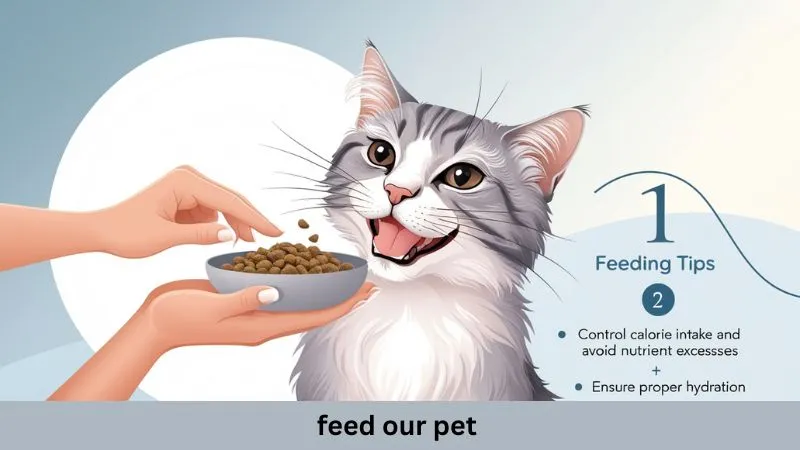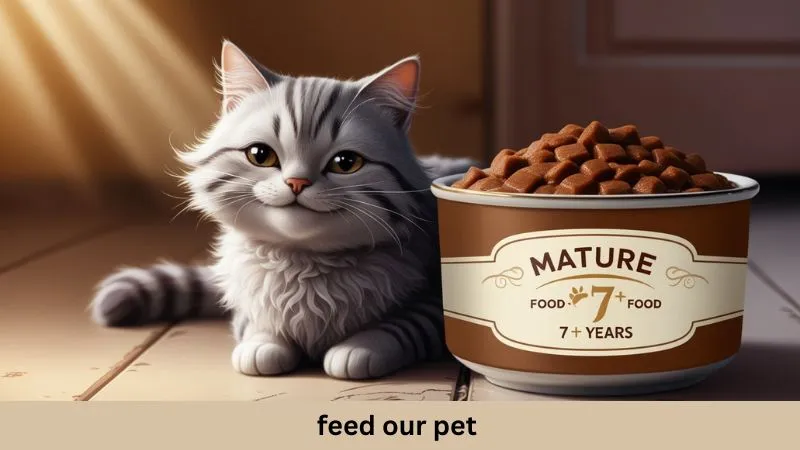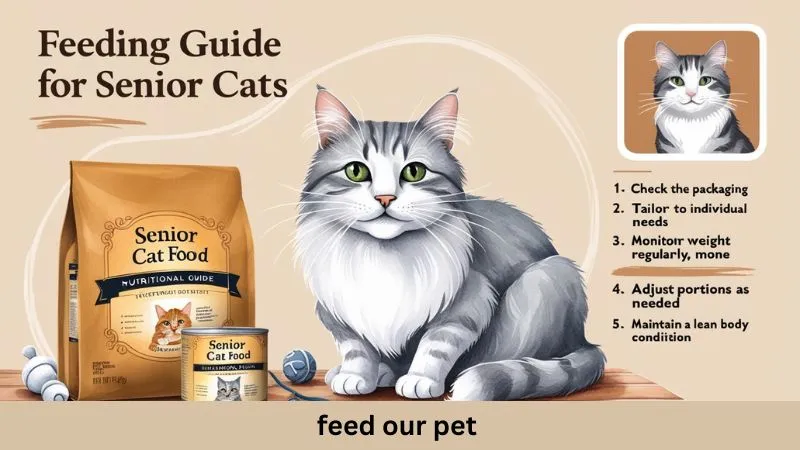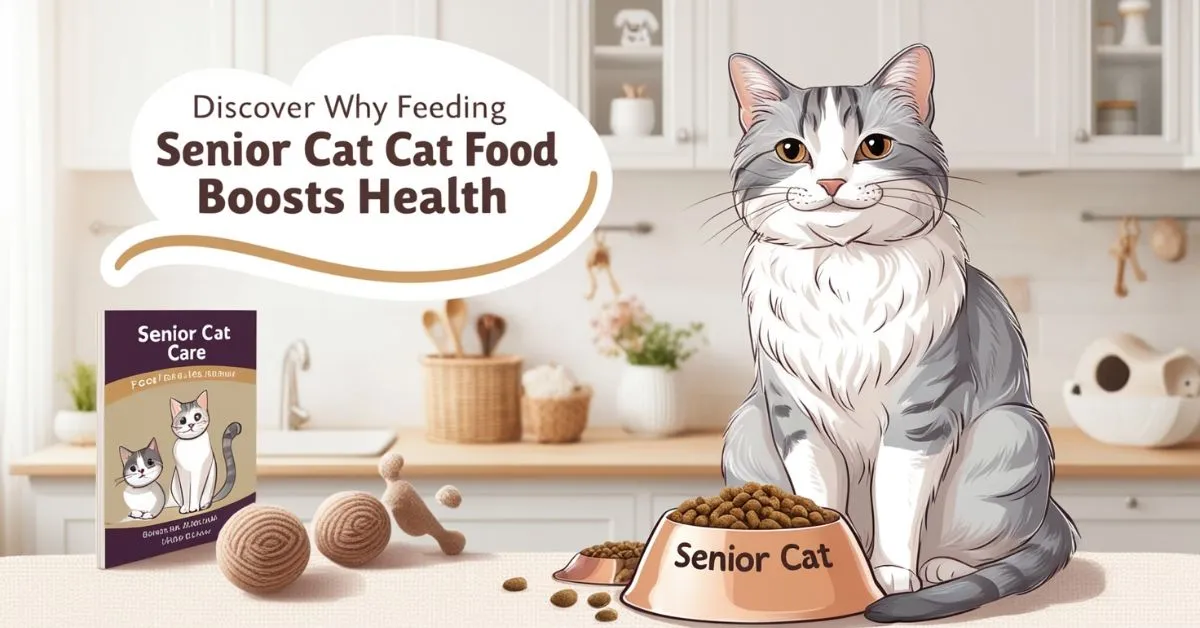As a cat owner, I’ve often wondered why senior cat food is so important for my aging feline friend. Senior cats, especially those who are less active, have unique dietary needs that cater to their slower metabolism. It’s vital to provide them with high-quality, easy-to-digest food that meets their nutritional requirements.
I’ve found that focusing on proteins and balanced energy from fats and carbohydrates helps keep my cat in good shape during his geriatric years. Moreover, as I pay attention to his appetite, taste, and smell, I see how he responds better to tasty diets that include essential vitamins and minerals.
Ensuring the right diet not only supports his aging joints but also boosts his immune system, keeping him healthier and happier as he ages.
Feeding Tips for Senior Cats

When it comes to feeding older cats, it’s best to offer smaller, more frequent meals rather than overwhelming them with a large amount of food at once. This approach is especially important if your cat has any medical conditions that may make it difficult for them to digest a large meal. Giving them food in little portions throughout the day can help manage their appetite and ensure they receive adequate nutrition.
Wet food is often more appealing to senior cats, so consider using opened cans or pouches that can be stored in the fridge. If you choose to refrigerate uneaten portions, remember to only keep them for up to 24 hours. To enhance the taste and smell, you can warm the food slightly in the microwave for a short time, allowing it to reach room temperature before serving.
Occasionally, treating your senior cat with a small piece of their favorite food can encourage their interest in meals, making mealtime a more enjoyable experience for them.
Feeding Senior Cats Dry Food
When choosing dry food for senior cats, it’s essential to select high-quality options that cater to their specific needs. Store the dry food in a clean environment, ensuring it is kept away from moisture and pests. Using re-sealable packaging or transferring the food to an airtight container can help maintain its freshness and protect it from becoming stale.
The tasty aroma of fresh dry food can significantly entice your senior cat, encouraging them to eat more. Regularly check the expiration date and avoid serving any food that has been opened for an extended period, as it may lose its flavor and nutritional value. By taking these steps, you can help ensure that mealtime remains an enjoyable experience for your aging feline companion.
How Should I Feed My Senior Cat?
When feeding senior cats, consider using a clean, low bowl or saucer that allows easy access without disturbing their whiskers. Older felines can be creatures of habit, so establishing a consistent feeding routine—same place and same time—helps create a sense of security. It’s best to place their feeding bowls in a quiet area, away from the hustle and bustle of daily life, ensuring a calm environment for them to eat.
When you have more than one cat, position the bowls a distance apart to prevent confrontations or bullying, especially if an older cat needs to eat more slowly due to health conditions. If you have fast-eating younger cats, it may be beneficial to create a separate area for your senior cat to avoid food theft. Regular monitoring of their weight and adjusting portion sizes as needed is crucial; older cats can struggle with weight management and may require specific feeding guides found on the back of their food packaging.
Adopting properly formulated senior cat foods can help maintain a lean and healthy body condition. Ensure they always have access to clean, fresh water, and consider using a larger metal or ceramic water bowl.
This can encourage them to stay hydrated, especially if they’re losing weight or gaining it unexpectedly. If your senior cat seems reluctant to eat or is showing changes in weight, consult your vet for advice tailored to their individual needs, as it may be indicative of underlying health issues.
Mature Cat Food (7 years plus)

As cats enter their middle age, typically around the age of seven, their metabolism begins to slow down, and they may become less active. This decrease in activity often leads to a risk of weight gain, which can further exacerbate health issues, especially if your feline friend is already overweight or obese. Choosing a mature cat food that is specifically formulated for this age group can be beneficial.
These diets tend to include high levels of good-quality protein to help maintain muscle mass while incorporating lower calories to prevent unwanted weight gain. Unlike regular adult cat foods, which may not account for the changing needs of aging cats, mature cat formulas offer the right balance to support a healthy lifestyle.
It is wise to consult your veterinarian for recommended dietary options that can ensure your cat gets the necessary nutrients without excessive calories, keeping them fit, healthy, and content as they age.
Senior Cat Food (11 Years Plus)
As cats reach the age of eleven and beyond, their dietary needs evolve to support their aging bodies. Older cats often face challenges in digestion, making it crucial to provide food that is easier to digest. High-quality protein sources are essential for maintaining muscle mass and adequate fat reserves; however, it’s important to choose calorie-rich foods that promote energy without overwhelming their digestive systems.
A diet balanced in proteins, fats, and carbohydrates can serve as a useful energy source while ensuring they do not lose weight excessively. It’s vital to select formulas that support joint health and overall general health as chronic kidney disease becomes a common concern in elderly cats. Foods designed for senior felines often include features aimed at protecting the kidneys, along with joint support supplements that can aid mobility.
If you are ever unsure about your aging cat’s diet or notice changes in their weight or disposition, it’s advisable to speak with your vet for tailored advice. Adopting the right diet for your mature friend can contribute significantly to their quality of life, ensuring they remain fit and comfortable throughout their golden years.
Prescription Cat Food
For senior cats with specific health conditions, a prescription diet may be necessary to manage their illnesses and provide optimal nutrition. These diets are specially formulated to support cats with chronic kidney disease, offering renal diets that help maintain kidney function while reducing the burden on these vital organs.
For cats experiencing gastrointestinal issues or sensitive stomachs, gastrointestinal diets can aid in digestion, promoting nutrient absorption and alleviating discomfort. Additionally, urinary diets are tailored for cats prone to crystal formation or urinary stones, addressing issues like stress-related cystitis by maintaining proper urine pH levels and hydration.
Consulting with your veterinarian is essential when considering prescription diets, as they can recommend the most suitable options based on your cat’s individual health needs and conditions. Proper management of their diet through prescribed nutrition can significantly improve the quality of life for older felines, ensuring they receive the necessary treatment to thrive in their senior years.
Feeding Guide for Senior Cats

Check the Packaging: Always refer to the feeding guidelines on the back of the cat food packaging. These recommendations can provide a baseline for how much to feed your senior cat based on their Weight and activity level.
Tailor to Individual Needs: Consider any specific health conditions your cat may have, as special dietary needs might require adjustments to the general feeding guidelines.
Monitor Weight Regularly: Regularly weigh your cat to ensure they maintain a healthy weight. This is particularly important for senior cats, as weight management can directly impact their health.
Adjust portions as needed: If your cat is gaining or losing weight, consult the feeding guidelines and adjust their portion sizes accordingly. Measuring their food can be useful to avoid overfeeding.
Maintain a Lean Body Condition: Aim for a lean body condition in senior cats, as excess weight can lead to various health complications and decreased mobility.
Consult Your Veterinarian: Always keep your vet in the loop regarding your cat’s diet and weight. They can provide tailored advice and ensure your feeding strategy effectively supports your cat’s health.
When is a Cat Considered a Senior?
A cat is usually considered a senior when it reaches around 11 years old. At this age, it might start to show some signs of aging, such as sleeping more, being less active, or changing its eating habits. It’s important to take good care of senior cats by providing regular vet check-ups and a comfortable home environment.
The Changing Nutritional Needs of Aging Cats
Hydration
Proper hydration is essential for aging cats, who are often more susceptible to kidney issues and dehydration. It is important to encourage regular water intake, which can be achieved by providing fresh, clean water daily and considering adding wet food to their diet.
Some cats may also benefit from water fountains, as the moving water can entice them to drink more frequently. Monitoring their water consumption and staying hydrated can significantly contribute to their health and well-being as they age.
Activity Level and Weight
As cats age, their activity levels often decrease, which can lead to weight gain and associated health problems. It is crucial to monitor their weight and adjust feeding portions accordingly. Engaging them in regular, gentle play can help maintain their muscle tone and promote healthy weight management.
Interactive toys and short play sessions tailored to their abilities can keep them stimulated and encourage movement. Understanding an older cat’s specific needs and adjusting their lifestyle can help support their health during aging.
Common Senior Health Problems and Dietary Solutions
| Heart Disease | Diabetes | Bone Health | Digestive Issues | Cognitive Decline |
| Eat fruits and vegetables. | Control portion sizes. | Include dairy or dairy alternatives. | Increase fiber intake with whole grains and beans. | Eat fatty fish rich in omega-3s. |
| Choose whole grains. | Eat lean proteins. | Eat leafy greens like spinach. | Drink plenty of water. | Include nuts and seeds. |
| Limit salt and sugar. | Limit salt and sugar. | Get enough vitamin D from sunlight or supplements. | Eat more fruits like apples and pears. | Drink green tea for antioxidants. |
Picking the Best Senior Cat Foods
When choosing the best food for senior cats, it’s important to look for options that are easy to digest and have the right nutrients. Senior cats often need more protein to help keep their muscles strong and less fat to manage their weight.
Look for foods that contain real meat as the first ingredient and added vitamins, like vitamin E and taurine, to support their health. Always make sure the food is made for senior cats, as it will have the right balance of nutrients for their age.
Feeding Guidelines for Your Pet
When considering how much to feed your pet, it’s important to use clean, low-feeding bowls or saucers, especially for older felines. These dishes should be designed to ensure that their sensitive whiskers don’t touch the sides of the bowl, which can be uncomfortable for them when they eat. Whether you’re serving wet food or dry, maintaining the freshness of their meals is key.
Aim to feed your pet in the same place and at the same time each day, creating a routine that helps them feel secure. Choose a quiet area away from the hustle and bustle of daily life, so they can focus on eating without distractions.
If you have more than one cat, position the feeding bowls a reasonable distance apart to prevent confrontations or bullying over food. For fast-eating younger cats, it may be beneficial to feed them in separate areas to prevent stealing from one another and to encourage healthier eating habits. Always ensure there is a freshwater bowl nearby to keep them hydrated alongside their meals.
Tips for Picky Eaters
Involve Them in Meal Prep
Let your picky eater help choose and prepare the food. This can make them more excited about eating what they helped to make. They might be more willing to try new foods if they feel included.
Offer Choices
Give a couple of options at meal times. For example, ask if they want carrots or peas. This helps them feel in control of what they eat, which can make mealtime easier.
Keep Trying
Don’t give up if they refuse food the first time. It can take many tries before they accept a new taste. Keep offering the food without pressure.
Make Food Fun
Turn meals into a fun experience. Use interesting shapes, colors, or even faces with the food. This can make healthy eating more enjoyable.
Be Patient
Remember, it’s okay to be slow in changing eating habits. Encourage them nicely and celebrate any small steps taken towards trying new foods.
Conclusion
In conclusion, providing senior cat food specifically tailored to the needs of older cats is essential for their health and well-being. As cats age, their nutritional requirements change, necessitating a diet that is rich in high-quality proteins, lower in calories, and fortified with essential vitamins and minerals.
Senior cat food can help manage age-related issues such as weight gain, arthritis, and dental health problems. Additionally, the right diet can support a strong immune system and promote overall vitality, ensuring that your feline companion enjoys a longer, happier life. By prioritizing their dietary needs, pet owners can significantly enhance the quality of life for their senior cats.
FAQs
Discover the Recipe for a Healthy Pet
A healthy pet needs a balanced diet full of essential nutrients. Add fresh fruits, veggies, and high-quality proteins to their meals. Don’t forget fresh water and regular exercise to keep them in top shape!
Can senior cats eat kitten food?
Senior cats can have kitten food occasionally because it’s higher in calories and nutrients. But it shouldn’t replace their regular diet, as seniors have different needs. Always check with your vet for the best food plan.
How many times a day should a senior cat eat?
Senior cats do best with smaller, more frequent meals—about 2 to 4 times a day. This helps with digestion and keeps their energy up. Watch how they respond and adjust as needed.
What do you feed an older cat that’s losing weight?
For older cats losing weight, choose high-calorie, nutrient-rich food made for seniors. Look for options with more protein and fat, and pick flavors they love to boost their appetite. Your vet can give personalized advice.
When is a cat considered senior?
Cats are usually considered senior around 7 years old, but it depends on their breed and health. Regular vet check-ups help track their aging and keep them healthy.
What is a nutrient profile?
A nutrient profile is the mix of essential nutrients—like proteins, fats, carbs, vitamins, and minerals—in your cat’s food. For senior cats, it’s especially important to support their aging bodies.
How do I control calorie intake and avoid nutrient excess?
Manage calories by controlling portions and choosing food made for senior cats. Keep an eye on their weight and work with your vet to find the right balance and avoid overfeeding.
